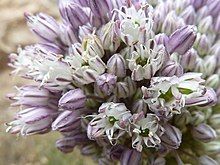Allium ampeloprasum
| Wild leek | |
|---|---|

| |
| Scientific classification | |
| Kingdom: | Plantae |
| Clade: | Tracheophytes |
| Clade: | Angiosperms |
| Clade: | Monocots |
| Order: | Asparagales |
| Family: | Amaryllidaceae |
| Subfamily: | Allioideae |
| Genus: | Allium |
| Subgenus: | A. subg. Allium |
| Species: | A. ampeloprasum
|
| Binomial name | |
| Allium ampeloprasum | |
| Synonyms[1] | |
|
Species synonymy
| |
Allium ampeloprasum is a member of the onion genus Allium. The wild plant is commonly known as wild leek or broadleaf wild leek. Its native range is southern Europe to southwestern Asia and North Africa,[2] but it is cultivated in many other places and has become naturalized in many countries.
Allium ampeloprasum has been differentiated into five cultivated vegetables, namely leek, elephant garlic, pearl onion, kurrat, and Persian leek.
Description
[edit]Wild populations produce bulbs up to 3 centimetres (1+1⁄4 inches) across. Scapes are round in cross-section, each up to 180 cm (71 in) tall, bearing an umbel of as many as 500 flowers. Flowers are urn-shaped, up to 6 millimetres (1⁄4 inch) across; tepals white, pink or red; anthers yellow or purple; pollen yellow.[3][4]
Distribution and habitat
[edit]Allium ampeloprasum is regarded as native to all the countries bordering on the Black, Adriatic, and Mediterranean Seas from Portugal to Egypt to Romania. In Russia and Ukraine, it is considered invasive except in Crimea, where it is native. It is also native to Ethiopia, Uzbekistan, Iran and Iraq. It is considered naturalized in the United Kingdom, Ireland, the Czech Republic, the Baltic States, Belarus, the Azores, Madeira, the Canary Islands, Armenia, Azerbaijan, Afghanistan, China, Australia (all states except Queensland and Tasmania), Mexico, the Dominican Republic, Puerto Rico, Haiti, the United States (southeastern region plus California, New York State, Ohio and Illinois), Galápagos, and Argentina.[1][3][5][6][7] In tidewater Virginia, where it is commonly known as the "Yorktown onion", it is protected by law in York County.[8]
The species may have been introduced to Britain by prehistoric people, where its habitat consists of rocky places near the coast in south-west England and Wales.[9][10]
Cultivation
[edit]Allium ampeloprasum is the source of several vegetables, most notably:
- Leek
- Elephant garlic or great-headed garlic
- Pearl onion
- Kurrat,[9][11] Egyptian leek or salad leek. This variety has small bulbs, and primarily the leaves are eaten.
- Persian leek (A. ampeloprasum ssp. persicum). A cultivated allium native to the Middle East and Iran, grown for culinary purposes and called tareh in Persian. The linear green leaves have a mild onion flavor and are eaten raw, either alone, or in food combinations.[12]
Gallery
[edit]See also
[edit]References
[edit]- ^ a b "Allium ampeloprasum". World Checklist of Selected Plant Families. Royal Botanic Gardens, Kew – via The Plant List. Note that this website has been superseded by World Flora Online
- ^ "Allium ampeloprasum L." Plants of the World Online. Royal Botanic Gardens, Kew.
- ^ a b McNeal Jr., Dale W.; Jacobsen, T. D. (2002). "Allium ampeloprasum". In Flora of North America Editorial Committee (ed.). Flora of North America North of Mexico (FNA). Vol. 26. New York and Oxford: Oxford University Press – via eFloras.org, Missouri Botanical Garden, St. Louis, MO & Harvard University Herbaria, Cambridge, MA.
- ^ Gleason, H. A. & A.J. Cronquist. 1991. Manual of the Vascular Plants of Northeastern United States and Adjacent Canada (ed. 2) i–910. New York Botanical Garden, Bronx.
- ^ "Allium ampeloprasum". County-level distribution map from the North American Plant Atlas (NAPA). Biota of North America Program (BONAP). 2014.
- ^ Xu, Jiemei; Kamelin, Rudolf V. "Allium porrum". Flora of China. Vol. 24 – via eFloras.org, Missouri Botanical Garden, St. Louis, MO & Harvard University Herbaria, Cambridge, MA.
- ^ "Allium ampeloprasum [Aglio porraccio] - Flora Italiana". luirig.altervista.org. Retrieved 2024-10-29.
- ^ "Yorktown Onion". www.yorkcounty.gov. Archived from the original on 2016-08-11.
- ^ a b "Allium ampeloprasum". Plants for a Future.
- ^ CHRISTOPHER D. PRESTON, DAVID A. PEARMAN, ALLAN R. HALL (2004) Archaeophytes in Britain Botanical Journal of the Linnean Society 145 (3), 257–294 doi:10.1111/j.1095-8339.2004.00284.x, p. 264
- ^ Grubben, G.J.H. & Denton, O.A. (2004) Plant Resources of Tropical Africa 2. Vegetables. PROTA Foundation, Wageningen; Backhuys, Leiden; CTA, Wageningen.
- ^ Mousavi, Amir; Kashi, Abedolkarim; Davoodi, Daryoush; Shariatpanahi, Mohammad Sanei (2006). "Characterization of an Allium Cultivated in Iran: The Persian Leek". Belgian Journal of Botany. 139 (1): 115–123. JSTOR 20794599.





